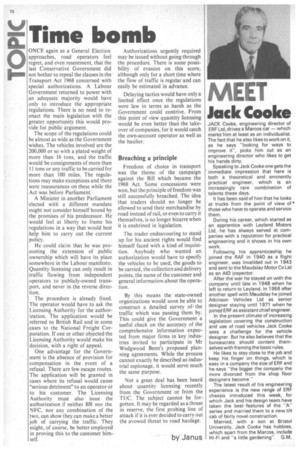Time bomb
Page 74

If you've noticed an error in this article please click here to report it so we can fix it.
ONCE again as a General Election approaches, road operators feel regret, and even resentment, that the last Conservative Government did not bother to repeal the clauses in the Transport Act 1968 concerned with special authorizations. A Labour Government returned to power with an adequate majority would have only to introduce the appropriate regulations. There is no need to reenact the main legislation with the greater opportunity this would provide for public argument.
The scope of the regulations could be almost as wide as the Government wishes. The vehicles involved are the 200,000 or so with a plated weight of more than 16 tons, and the traffic would be consignments of more than 11 tons or any traffic to be carried for more than 100 miles. The regulations may make exceptions and there were reassurances on these while the Act was before Parliament.
A Minister in another Parliament elected with a different mandate might not consider himself bound by the promises of his predecessor. He would feel at liberty to frame his regulations in a way that would best help him to carry out the current policy.
He could claim that he was promoting the extension of public ownership which will have its place somewhere in the Labour manifesto. Quantity licensing can only result in traffic flowing from independent operators to publicly-owned transport, and never in the reverse direction.
. The procedure is already fixed. The operator would have to ask the Licensing Authority for the authorization. The application would be referred to British Rail and in some cases to the National Freight Corporation. If one or other objected the Licensing Authority would make his decision, with a right of appeal.
One advantage for the Government is the absence of provision for compensation in the event of a refusal. There are few escape routes. The application will be granted in cases where its refusal would cause "serious detriment" to an operator or to his customer. The Licensing Authority must also issue the authorization if neither BR nor the NFC, nor any combination of the two, can show they can make a better job of carrying the traffic. They might, of course, be better employed in proving this to the customer himself. Authorizations urgently required may be issued without going through the procedure. There is some possibility of evasion on this score, although only for a short time where the flow of traffic is regular and can easily be estimated in advance.
Delaying tactics would have only a limited effect once the regulations were law in terms as harsh as the Government could contrive. From this point of view quantity licensing would be even better than the takeover of companies, for it would catch the own-account operator as well as the haulier.
Breaching a principle
Freedom of choice in transport was the theme of the campaign against the Bill which became the 1968 Act. Some concessions were won, but the principle of freedom was still successfully breached. The idea that traders should no longer be allowed to send their merchandise by road instead of rail, or even to carry it themselves, is no longer bizarre when it is enshrined in legislation.
• The trader endeavouring to stand up for his ancient rights would find himself faced with a kind of inquisition. Anybody who wanted an authorization would have to specify the vehicles to be used, the goods to be carried, the collection and delivery points, the name of the customer and general information about the operation.
By this means the state-owned organizations would soon be able to construct a detailed survey of, the traffic which was passing them by. This could give the Government a useful check on the accuracy of the comprehensive information expected from major firms in key industries invited to participate in Mr Wedgwood Benn's proposed planning agreements. While the process cannot exactly be described as industrial espionage, it would serve much the same purpose.
Not a great deal has been heard about quantity licensing recently from the Government or from the TUC. The subject cannot be forgotten. It may be regarded as a threat in reserve, the first probing line of attack if it is ever decided to carry out the avowed threat to road haulage.


























































































































































